Hyundai i10 VS VW ID. Buzz Bus – Specs, Efficiency & Price Comparison
Which model is the better choice – the Hyundai i10 or the VW ID. Buzz Bus? We compare performance (90 HP vs 340 HP), boot capacity (252 L vs 1340 L), efficiency (4.90 L vs 19 kWh), and of course, the price (14600 £ vs 42900 £).
Find out now which car fits your needs better!
The Hyundai i10 (Hatchback) is powered by a Petrol engine and comes with a Manuel or Automatic transmission. In comparison, the VW ID. Buzz Bus (Bus) features a Electric engine and a Automatic gearbox.
When it comes to boot capacity, the Hyundai i10 offers 252 L, while the VW ID. Buzz Bus provides 1340 L – depending on what matters most to you. If you’re looking for more power, you’ll need to decide whether the 90 HP of the Hyundai i10 or the 340 HP of the VW ID. Buzz Bus suits your needs better.
There are also differences in efficiency: 4.90 L vs 19 kWh. In terms of price, the Hyundai i10 starts at 14600 £, while the VW ID. Buzz Bus is available from 42900 £.
Compare all the key specs now and find out which model fits your lifestyle best!
Hyundai i10
The Hyundai i10 impresses with its compact design, making it an ideal choice for navigating through busy urban environments. Its interior is surprisingly spacious, offering drivers and passengers comfort beyond what one might expect from a city car. The model combines efficiency and practicality, making it an attractive option for those seeking both economy and functionality in their daily commute.
details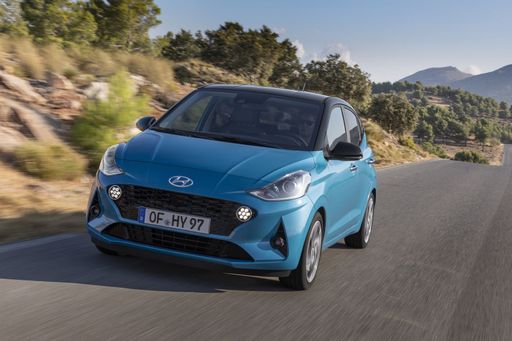 @ hyundai.news
@ hyundai.news
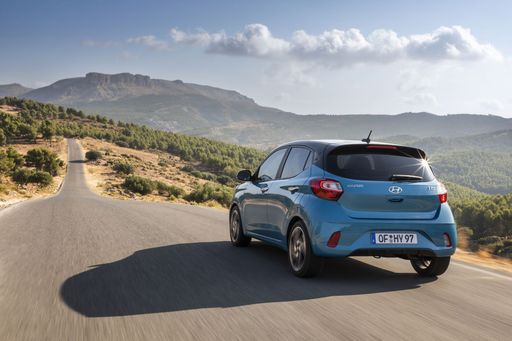 @ hyundai.news
@ hyundai.news
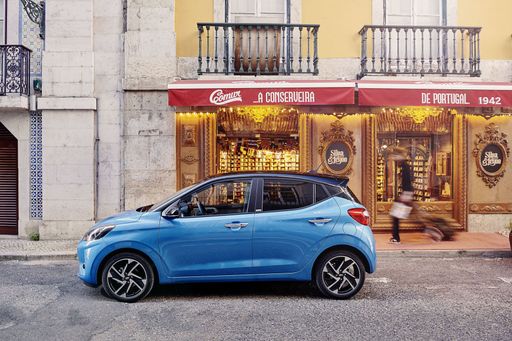 @ hyundai.news
@ hyundai.news
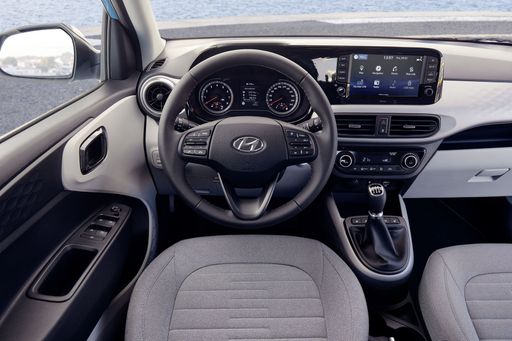 @ hyundai.news
@ hyundai.news
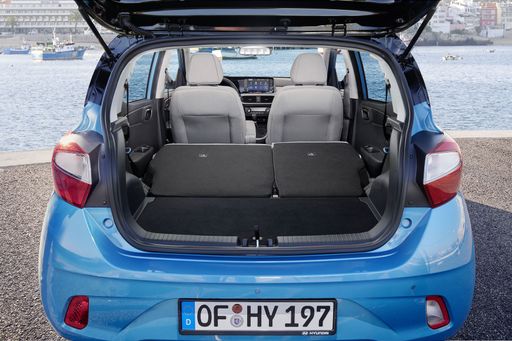 @ hyundai.news
@ hyundai.news
VW ID. Buzz Bus
The VW ID. Buzz Bus marks a bold step into the future with its blend of retro charm and innovative electric technology. This all-electric vehicle offers an impressive range, making it ideal for both urban driving and longer excursions. Its spacious interior and advanced connectivity features ensure a comfortable and connected journey for all passengers.
details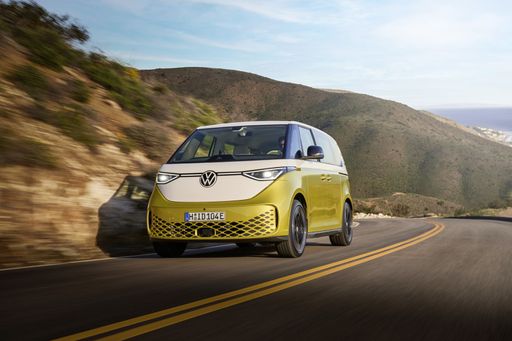 @ Volkswagen
@ Volkswagen
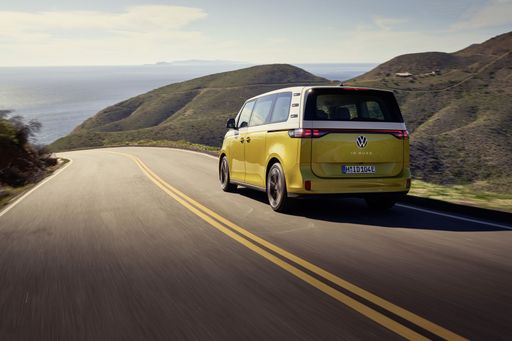 @ Volkswagen
@ Volkswagen
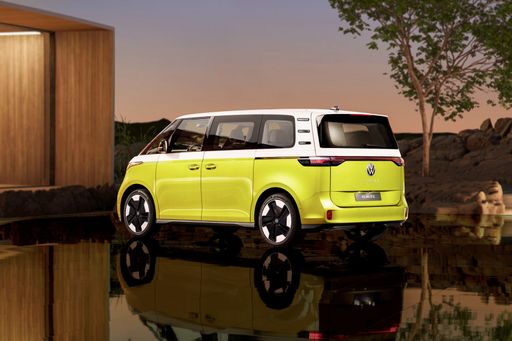 @ Volkswagen
@ Volkswagen
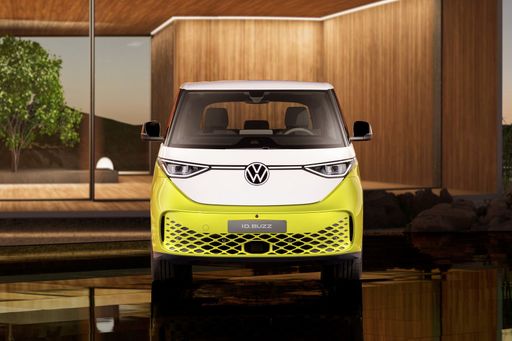 @ Volkswagen
@ Volkswagen
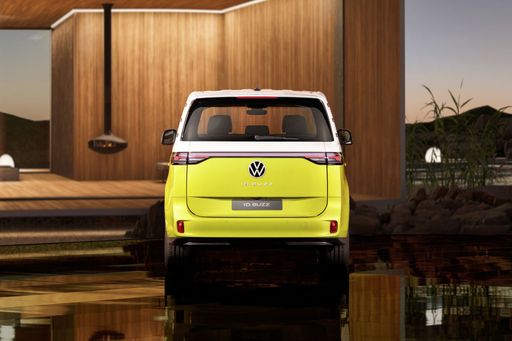 @ Volkswagen
@ Volkswagen
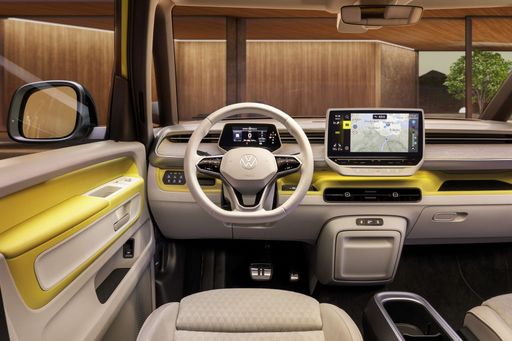 @ Volkswagen
@ Volkswagen
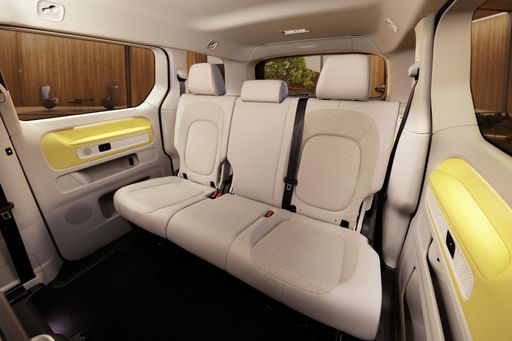 @ Volkswagen
@ Volkswagen
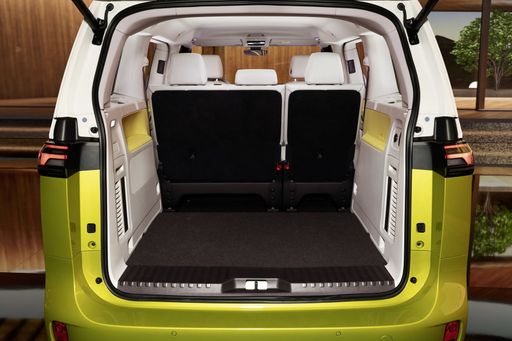 @ Volkswagen
@ Volkswagen
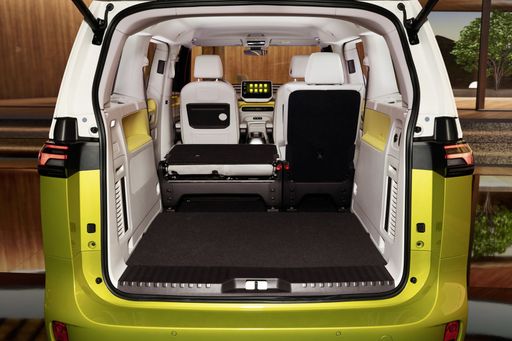 @ Volkswagen
@ Volkswagen

|

|
|
|
|
Costs and Consumption |
|
|---|---|
|
Price
14600 - 19000 £
|
Price
42900 - 64200 £
|
|
Consumption L/100km
4.9 - 5.4 L
|
Consumption L/100km
-
|
|
Consumption kWh/100km
-
|
Consumption kWh/100km
19 - 20.6 kWh
|
|
Electric Range
-
|
Electric Range
329 - 485 km
|
|
Battery Capacity
-
|
Battery Capacity
59 - 86 kWh
|
|
co2
111 - 123 g/km
|
co2
0 g/km
|
|
Fuel tank capacity
36 L
|
Fuel tank capacity
-
|
Dimensions and Body |
|
|---|---|
|
Body Type
Hatchback
|
Body Type
Bus
|
|
Seats
4 - 5
|
Seats
5
|
|
Doors
5
|
Doors
5
|
|
Curb weight
996 - 1099 kg
|
Curb weight
2400 - 2780 kg
|
|
Trunk capacity
252 L
|
Trunk capacity
1121 - 1340 L
|
|
Length
3670 - 3675 mm
|
Length
4712 - 4962 mm
|
|
Width
1680 mm
|
Width
1985 mm
|
|
Height
1480 - 1483 mm
|
Height
1924 - 1927 mm
|
|
Payload
344 - 423 kg
|
Payload
462 - 600 kg
|
Engine and Performance |
|
|---|---|
|
Engine Type
Petrol
|
Engine Type
Electric
|
|
Transmission
Manuel, Automatic
|
Transmission
Automatic
|
|
Transmission Detail
Manual Gearbox, Automated Manual
|
Transmission Detail
-
|
|
Drive Type
Front-Wheel Drive
|
Drive Type
Rear-Wheel Drive, All-Wheel Drive
|
|
Power HP
63 - 90 HP
|
Power HP
170 - 340 HP
|
|
Acceleration 0-100km/h
11.4 - 18.4 s
|
Acceleration 0-100km/h
6.1 - 10.7 s
|
|
Max Speed
143 - 175 km/h
|
Max Speed
145 - 160 km/h
|
|
Torque
93 - 172 Nm
|
Torque
310 - 679 Nm
|
|
Number of Cylinders
3 - 4
|
Number of Cylinders
-
|
|
Power kW
46 - 66 kW
|
Power kW
125 - 250 kW
|
|
Engine capacity
998 - 1197 cm3
|
Engine capacity
-
|
General |
|
|---|---|
|
Model Year
2024
|
Model Year
2024
|
|
CO2 Efficiency Class
C, D
|
CO2 Efficiency Class
A
|
|
Brand
Hyundai
|
Brand
VW
|
Hyundai i10
Introduction to the Hyundai i10
The Hyundai i10 has consistently proven to be a dependable and stylish companion for urban driving. Known for its compact design and efficiency, this hatchback offers a perfect blend of modern aesthetics and practicality, making it a popular choice for city dwellers and small families alike.
Performance and Efficiency
The Hyundai i10 is available with both manual and automatic transmissions, catering to various driving preferences. Engine power ranges from 63 to 90 PS, providing a versatile driving experience for both novice and seasoned drivers. The fuel consumption varies between an impressive 4.9 to 5.4 litres per 100 kilometres, fitting for those looking to minimise fuel costs while also reducing their carbon footprint.
Engine and Transmission
Equipped with a choice of 1.0-litre or 1.2-litre engines, the i10 offers up to 172 Nm of torque, ensuring lively performance. The models feature front-wheel-drive configurations, allowing for smooth handling and reliable road performance. The car excels in city driving but is equally capable on longer journeys.
Interior and Comfort
Despite its compact size, the Hyundai i10 does not compromise on interior space and comfort. It accommodates four to five occupants comfortably, offering sufficient legroom and headroom. Its flexible seating arrangement and a 252-litre boot make it ideal for both quick trips and weekend getaways.
Safety and Technology
Safety remains a priority with Hyundai, and the i10 is no exception. It comes equipped with multiple airbags, stability control, and advanced braking systems. Technology-wise, the i10 features a user-friendly infotainment system with smartphone connectivity, ensuring a pleasant and connected drive.
Design and Style
The Hyundai i10’s design is both modern and sleek, making it stand out in the compact hatchback segment. With a length ranging from 3670 to 3675 mm, a width of 1680 mm, and a height of 1480 to 1483 mm, the i10 strikes a perfect balance between style and functionality.
Affordable Pricing and Value
The i10 is available in several trims including the Select, N Line, and Prime, among others, with prices ranging from €16,990 to €22,190. Considering its features and low running costs — with monthly expenses estimated between €694 to €793 — the Hyundai i10 offers substantial value for those seeking an economical yet stylish hatchback.
Conclusion
The Hyundai i10 combines efficiency, modern design, and practicality in a compact package. Whether you are seeking a reliable city car or an economical daily driver, the Hyundai i10 is a strong contender worth considering in the compact car market of 2024.
VW ID. Buzz Bus
Unveiling the VW ID. Buzz Bus: The Future of Electric Mobility
The automotive industry is buzzing with excitement as Volkswagen unveils its latest addition to the electric vehicle lineup, the VW ID. Buzz Bus. This highly anticipated model marries nostalgia with innovation, recalling the iconic VW Microbus while pushing the boundaries of modern automotive technology. Designed for the environmentally conscious driver who refuses to compromise on style or performance, the ID. Buzz Bus promises to be a game-changer in the world of electric vehicles.
Sleek Design Meets Cutting-Edge Technology
The VW ID. Buzz Bus stands out not just for its retro charm but for its forward-thinking design. Sporting a sleek, aerodynamic silhouette, the vehicle offers spacious interiors with five comfortable seats and a generous trunk capacity ranging from 1121 to 1340 liters. The ID. Buzz's design is not only stylish but functional, emphasizing both utility and comfort for the modern driver.
Powerful Electric Performance
Under the hood, the VW ID. Buzz Bus offers a range of robust electric engines. The rear-wheel drive models feature options of 170 HP or 286 HP, while for those seeking more power, the all-wheel drive GTX variant boasts an impressive 340 HP. These electric motors provide a smooth and responsive driving experience, perfect for both urban commuting and longer road trips.
With acceleration from 0 to 100 km/h in as little as 6.1 seconds depending on the model, the ID. Buzz Bus combines the thrill of quick take-off with energy efficiency. This electric powerhouse ensures zero CO2 emissions, aligning perfectly with environmental standards and sustainability goals.
Impressive Range and Efficiency
The ID. Buzz Bus's battery options include capacities of 59 kWh, 79 kWh, and 86 kWh, allowing for an electric range from 423 km to an impressive 487 km on a single charge. This range ensures drivers can enjoy long journeys with minimal charging stops, making the ID. Buzz Bus an ideal companion for adventure seekers and eco-conscious travelers alike.
Consumption figures are equally competitive, with figures starting at 19 kWh/100km. The vehicle's CO2 efficiency class is proudly rated at A, underscoring Volkswagen's commitment to producing environmentally friendly vehicles.
Advanced Features and Safety
Innovation doesn't stop at the engine; the VW ID. Buzz Bus is packed with advanced technology and safety features. Equipped with an automatic transmission, reduction gearbox details, and a top speed of 160 km/h, the ID. Buzz Bus ensures a safe and robust performance. The vehicle's torque reaches up to 679 Nm, offering powerful and efficient handling.
Safety is a priority, with state-of-the-art driver assistance systems designed to protect occupants and pedestrians alike. With Volkswagen's commitment to safety and innovation, the ID. Buzz Bus sets a new standard for electric vehicles.
The New Era of Mobility
The VW ID. Buzz Bus is more than just a vehicle; it's a symbol of the new era of mobility where sustainability and innovation run parallel. With a range of models and features to choose from, it caters to diverse driving needs while staying true to its eco-friendly ethos. As the world shifts towards electric mobility, the ID. Buzz Bus is set to lead the way, inspiring a cleaner, greener future.
Volkswagen's latest offering is a testament to their dedication to innovation, style, and sustainability, ensuring that the ID. Buzz Bus is not just a car, but a lifestyle choice for those ready to embrace the future of transportation.
The prices and data displayed are estimates based on German list prices and may vary by country. This information is not legally binding.
